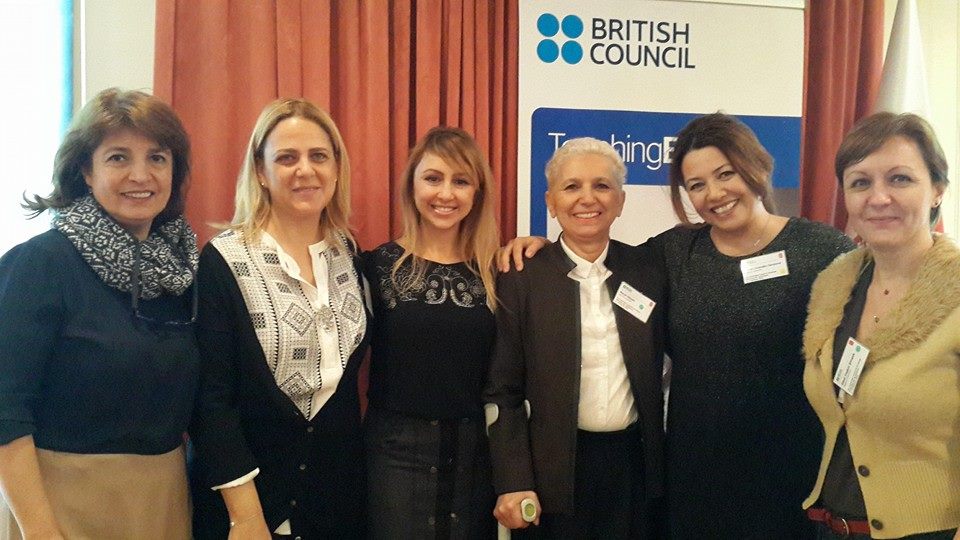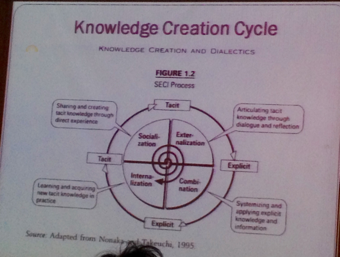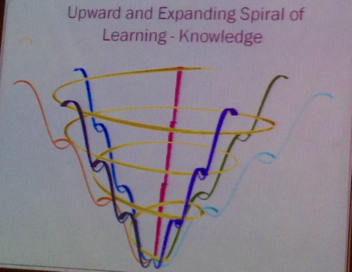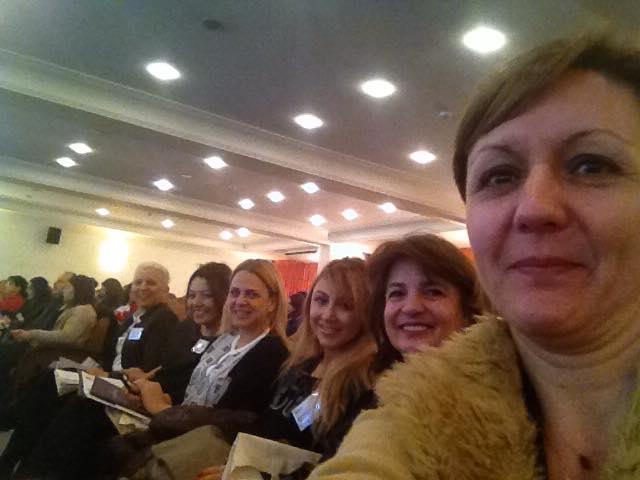BC & Hacettepe University Symposium
BC & Hacettepe University Symposium
2-3 February 2015
Deniz Çiçekoğlu Daryavuz, Meral Güçeri, Nezaket Özgirin, Sibel Taşkin Şimşek, Suzan Altıparmak and Şila Yosulçay

The 2nd British Council & Hacettepe University Symposium was held at Hacettepe University Beytepe Campus in Ankara on the 2nd and 3rd February 2015. The conference hosted speakers from a wide range of universities in Turkey. There were plenary talks, research paper presentations, discussion groups and the panel which created the opportunity to interact with colleagues and share ideas on Continuous Professional Development (CPD). Sabancı University was represented by Deniz Çiçekoğlu Daryavuz, Meral Güçeri, Nezaket Özgirin, Sibel Taşkin Şimşek, Suzan Altıparmak and Şila Yosulçay. Meral & Deniz presented their research study entitled “Techno Fear Techno Joy for Sustainable Professional Development”. They shared their findings related to teacher attitude to the use of technology in their teaching. We would like to share some of the highlighs from the symposium.
1st Plenary Talk “Assessing the Impact of Professional Learning” by Prof. Dr. Simon Borg
Reviewed by Meral Güçeri
Prof. Dr.Simon Borg has been involved in ELT for more than 25 years in a range of international contexts. He has worked for the University of Leeds as a TESOL professor. Simon now works full-time as an ELT consultant.
Simon focused on the assessment of professional learning under several sub headings such as “Training- Transmission” where he highlighted the role of individual and institutional behaviour, the periodic nature of input and how it could individually be defined. Then he discussed “Development-Constructivist” clarifying how reflection could be teacher led, well situated and ongoing as it is a social activity. While analysing international trends, Simon stressed professional learning as the key followed by teacher training.
His reflections on CPD in higher education in Turkey was shared under the following categories:
•2014 Hacettepe Conference
•Sharing of CPD practices
•Wider dissemination
•British Council Publication
Where the approaches to CPD are concerned, Simon said that the courses, teacher research, reflective programs, peer evaluation, task groups and peer observation are the most applicable and commonly used tools. He added that the maturatity of CPD is achieved by raising awareness, provision of support, theorization and evaluation. Simon ended his talk by highlighting the impact evaluation which should be based on the answers to the questions “when”, “what”, “who” and “how”.
“Integrated Teacher Research” by Jerome C. Bush
Reviewed by Deniz Cicekoglu Daryavuz
The research study Bush talked about was one which he labeled as Practitioner Research, which was in essence, Action Research. It was particularly interesting since, according to research, there is a paucity of information regarding K-12 issues. The presentation was about a study that was conducted during the 2013-14 academic year at a private school in Istanbul. Thirty two teachers participated in the study. The teachers had to choose an area of interest, do a literature review, and write a report at the end. The findings of the research indicated that the study had created a collaborative environment in the school which led to some improvement in the classes and, most importantly, teachers developed as a result of this process.
Bush started by listing the kinds of research conducted by teachers, and talked about Practitioner Research in detail. He highlighted the fact that, when he launched his study, high school teachers were reluctant about carrying out research, and that they were also rather resistant. They believed such an endeavor was exclusively for the academicians, and they felt afraid and insecure. However, after they started their individual projects, and did some reading, they started sharing their ideas and collaborated more with the other teachers. At the end of the project, they had to write individual reports. The quality of the reports was variable, but despite this, the teachers had a positive impression at the end, and got something out of it.
2nd Plenary Talk “Why…?” Engaging Curiosity in Language Education: An Exploratory Practice Approach by Judith Hanks
Reviewed by Nezaket Özgirin
Judith Hanks, who has taken on a lectureship in TESOL, is currently teaching at the School of education, at University of Leeds. She has been involved in Exploratory Practice (EP) and has been working with different colleagues from different parts of the world to develop a framework of principles for relevant research for language teachers and learners. In her talk she tried to answer the questions what beginner teachers look forward to and experienced teachers and trainers look back on focusing on the challenges and opportunities for all parties through EP. In her talk she raised some ‘puzzles’ about teaching/learning /training experiencces. Some of these are: Why do some students feel their ability is higher than it is, whilst others remain permanently pessimistic?; Why do some students have unrealistic expectations of their ability? Why do my students fall asleep in class? Why do I never finish the work I set out to do with the class? Then she highlighted the importance of curiosity with a quotation from Frei (1973:36) “…. An education of ‘I wonder’ instead of merely ‘I do’…..”
After giving some definitions of EP by Allright 2003, Breen 2006, she concluded saying that EP is a way for teachers and learners to work together to understand the aspects of their classroom practice that puzzle them through the use of normal pedagogic procedures as investigative tools. Some of the principles of EP that were shared were: 1. Put ‘quality of life’ first; 2. Work primarily to understand classroom language learning life; 3. Involve everybody; 4. Work to bring people together; 5. work for mutual development; 6. make the work a continuous enterprise; 7. Integrate the ‘work for understanding’ into existing curricular practices.
The challenges for practitioner research were also mentioned: time, relevance of the research agenda/findings to the participants, resources (physical, mental, financial) and expertise of participant-researchers. However, it was emhpazied that any teacher can do research through EP as long as they know what puzzles them.
Finally, Judith shared two case studies with the participants: the EP process of two teachers: Jenny and Bella: setting their own research agendas (puzzles), working together to explore their agendas, collecting data, analysing it, preparing presentations of their findings and finally giving presentations to other learners and teachers. Two outcomes of this process were indicated as the following. First, the teachers noticed a shift in motivation and related this directly to the EP work that they were doing, Second, they presented a renewed respect for student knowledge, and a move away from the instrumental, functional parameters of asking ‘how (to)’ and towards the pedagogical, philosophical implications of exploring.
In conclusion, teacher and trainer motivation in CPD can be improved by looking back to: where we come from and looking forward to: where we are going. The potentiol of EP for building bridges was stated with a quotation.
“Practioners capable of investigating their own classrooms and of monitoring the effects that different approaches, methodologies and techniques have on their teaching are no longer at the mercy of policy changes or paradigm shifts, for they are capable of assessing innovations and of coming to informed decisions, supported by evidence, about the innovation in relation to their work.” (Özdeniz, 1996: 123)
3rd Plenary Talk Professional Development for Pre-Service English Language Teachers Through Collaborative Action Research by Prof. Dr. Yasemin Kırkgöz
Reviewed by Suzan Altıparmak
 Prof. Dr.Yasemin Kırkgöz is a professor at the ELT Department of Çukurova University, Turkey. She completed her MA and PhD at Aston University, England. She has previously been a vice director and director of the Centre for Foreign Languages, curriculum coordinator, and teacher trainer. Her main research interests include foreign language education policy and its implementation, curriculum renewal, innovation management, EAP/ESP in higher education, and teacher education.
Prof. Dr.Yasemin Kırkgöz is a professor at the ELT Department of Çukurova University, Turkey. She completed her MA and PhD at Aston University, England. She has previously been a vice director and director of the Centre for Foreign Languages, curriculum coordinator, and teacher trainer. Her main research interests include foreign language education policy and its implementation, curriculum renewal, innovation management, EAP/ESP in higher education, and teacher education. Prof. Kırkgöz first gave some insight on the Teacher Education Programs in Turkey focusing mainly on the 4th year when the future teachers practice “practum” which gives them the opportunity to apply their pedagogical knowledge and skills. However, she realized that, the trainees fall into a dilemma about what they have been taught, what they observe and what they believe in which do not match in actuality. In order to overcome this, she decided to carry out a CAR (Collaborative Action Research) the aim of which was: The provisional benefits of CAR was to make pre-service and in-service teachers become more reflective, critical and analytical about their teaching practices.
The research was carried out with 8 trainee teachers all supervised at different schools over a 10-week period. The process involved:
- Orientation
- Preparing an action plan
- Reading relevant literature
- Conducting research in their context
- Reflecting upon the action taken
- Re-planning/re-acting until reaching the goal
The data was collected through interviews, classroom observations (3 out of 14 lessons were video recorded), reflective journals and collaborative meetings (3 meetings in 10 weeks).
It turned out that many trainees were surprised to see how real classroom conditions were - in terms of methodology - dramatically different compared to what they had learned and observed and re-learned/un-learned throughout the process.
This research must have provided the trainees with a lot of reflection and food for thought and whether a novice or very experienced, teaching is an endless journey in which you keep on learning, questioning and re-learning.
Keep Calm I’m a Teacher Trainer by Esengül Hasdemir
Reviewed by Şila Yosulçay
Esengül Hasdemir worked as an educational consultant for many years and now she is an instructor and teacher trainer at Atılım University. She is mainly interested in teacher training for which she attended many in service workshops.
Along these lines, her session was related to the skills, qualifications and knowledge a trainer needs to possess along with the responsibilities of a teacher. Esengül also focused on the question of why teachers are hesitant to call themselves trainers.
First, to be able to find out the skills and qualifications a trainer needs to have on a global scale, Esengül Hasdemir looked for job descriptions of teacher trainers required by many universities in the USA. Having analyzed teacher trainer adverts, she found out that a trainer is required to know her subject matter, be aware of the principles of adult learning, motivation strategies and have a repertoire of creative ideas. Regarding qualifications, a teacher is supposed to have a high level of English proficiency, advanced degree in teaching English, ample experience in the field, the ability to cooperate with colleagues and be willing to work in a different cultural context. According to the adverts, a teacher also needs to be enthusiastic to conduct workshops and have excellent interpersonal communication.
Secondly, Esengül explained the responsibilities of teacher trainers as follows:
•motivating new teachers,
•planning, preparing and conducting training sessions,
•observing lessons and giving feedback,
•attending meetings,
•interviewing teachers,
•creating, engaging and stimulating,
•collaborating with colleagues,
•evaluating the implementation of the programme
•reporting the information
Finally, she provided the audience with a list of teacher training programs for those who would like to be trainers and suggested that teachers should not be afraid or hesitant to call themselves “trainers” because they have an important role for novice teachers and institutions.
4th Plenary Talk “Deveoping a Culture of In-Service Teacher Learning” by Dr. John O’Dwyer
Reviewed by Sibel Taşkın Şimşek

Asst. Prof. Dr. John O’Dwyer is the director of Bilkent University School of English Language (BUSEL) and general coordinator of Özel Bilkent Schools. John is interested in organisational development and learning, language testing and evaluation, and in-service teacher education and professional learning.
The focus of John O’Dwyer’s talk was on the importance of in-service teacher learning for the institutions that want to create a culture of institutional learning. The aim of the session was “to develop a rationale for in-service development from an institution’s and an individual’s perspectives, i.e. organisational and personal learning, to discuss how institutional and individual in-service learning can best be met and to reflect on the role of in-service educators in the process of in-service teacher learning”. At the start of his talk, a diagram with many smiley faces representing the people he has been working with was used to attract the attention of the audience to the fact that every day in every lesson each teacher gains a new experience. Their beliefs, the way they do things change gradually and they learn something new. This is called “intellectual capital”, which is an important concept because if institutions invest in people they will also develop their intellectual capital. The challenge for organisations is how to capitalise on this learning which continues every single day in their institutions. By referring to the famous tree called Eywa (Tree of Souls) from the film “Avatar”, he emphasised how institutions and education are linked to each other like a single brain. He also mentioned that institutions are not simple brains made of electrical impulses but they are “ a community of minds” made of “connections” as was stated in the quote made by Raymond Tallis from The Guardian ( April 29, 2012). In order to achieve this, he suggested seeing meetings, for example, opportunities to create “community brains” in the institution since wider learning option takes place in the meetings. “The Knowledge Creation Cycle” (SECI Process) explains the cyclical learning by putting emphasis on socialization and externalization, where everybody gets connected through meetings. Then, in more formal formation, i.e. combination and internalization, by getting people to reflect, one can start to create explicit knowledge, which then becomes widely available by connecting to other people from different institutions. At that point, the cycle begins again.
 As shown in “the upward and expanding spiral of learning-knowledge” diagram, both the individual and the institution learn as one goes through the stages mentioned in the cycle.
As shown in “the upward and expanding spiral of learning-knowledge” diagram, both the individual and the institution learn as one goes through the stages mentioned in the cycle. The implications of in-service training such as doing the same thing again and again to be able to know “how to learn”, which is called “double-loop learning”, creating a culture of learning, creating conditions for exchange to make learning explicit were also mentioned in the talk. As practical implications, he pointed out that the leaders need to create open dialogue & experience sharing opportunities for the staff by creating common areas such as open staff rooms or coffee places. Focused peer observations, coaching, professional development slots, research & conference presentations were also some other suggestions. Competency frameworks like British Council (CPD), BALEAP, and Cambridge were also mentioned in the talk. John shared the career progression opportunities in his context in three categories; formal expected courses e.g. COTE, DOTE, ICELT etc., voluntary courses e.g. CDC, PhDs, MAs etc. and Ad Hoc Development e.g. Testing, Evaluation, CEFR etc. His final remarks in the talk were that staff related progression can be achieved through opportunities provided by the institutions rather than compulsory participation.

